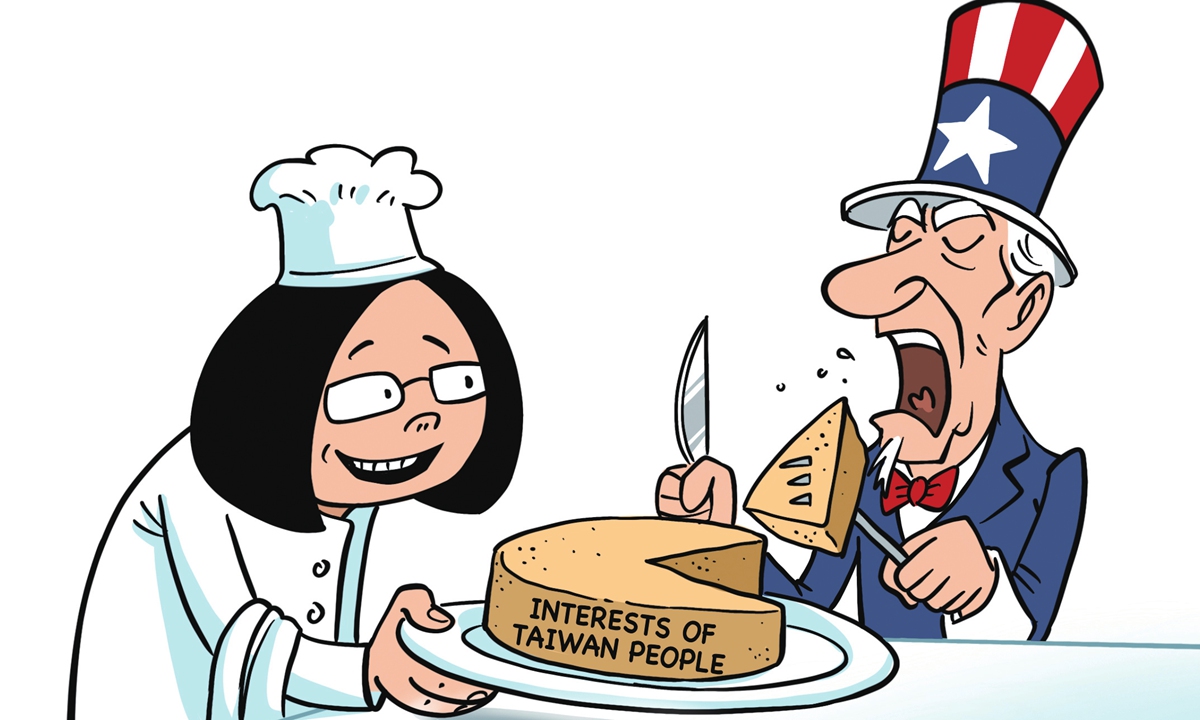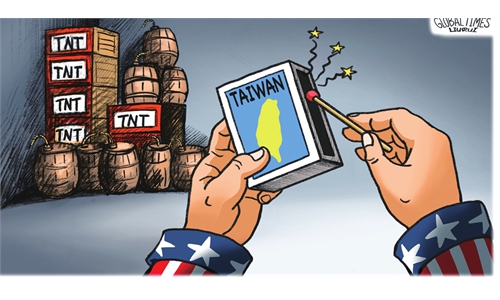As the US seeks to exploit Taiwan’s market, it speaks with a poisoned beef tongue

Illustration: Liu Rui/GT
It was reported on Tuesday that the Taiwan authorities had suspended the import of beef tongues from the US as the shipments were found to be infected with parasites, rendering them a health and safety hazard.The suspension comes amid the overwhelming enthusiasm of separatists in Taiwan to deepen trade and economic ties with the US in a bid to promote separation from China, even accumulating in the "formal opening" of trade talks between the US and the island of Taiwan following US house speaker Nancy Pelosi's provocative visit at the beginning of August.
However, this incidence shows that the US lavishes its overtures on Taiwan with a forked tongue, and in this case a beef one. America has no interest other than to exploit the island for its own political and commercial interests, using it as a tool against the Chinese mainland. It only shows in turn how Taiwan's regional leader Tsai Ing-wen is willing to sell out the island's best interests in the view to obtaining whatever support and attention from foreign powers she can get.
The import of parasite-ridden beef tongues is not the only example of Taiwan overlooking blatant problems in its bid to court the US, or for that matter its allies too. Only last year did the DPP authorities decide to lower the island's food safety standards in order to pave the way for the import of ractopamine pork, which is banned in the European Union, the Chinese mainland and many other countries and regions across the world for its proven side effects of increasing the probability of heart problems. The DPP authorities did so despite overwhelming public opposition to the measure, rigging a referendum in their favor.
The intention is quite simple: To import more and more goods from the so-called allies with the aim of literally giving them whatsoever they want in the view of trying to inflate the island's relevance as much as possible. Another example is the fact that Taiwan also greenlighted the import of food from the nuclear-contaminated prefecture and waters of Fukushima, Japan, another set of goods most countries have been avoiding due to blatant health and safety risks associated with its dumping of contaminated wastewater into the sea. The DPP authorities once again have no issues with this, despite the fact that all other regional neighbors, including the Chinese mainland, South Korea, and the Philippines, have lodged strong opposition to the plans.
Similarly, if China has a dispute with other countries and implements countermeasures, the island of Taiwan often dives in head first as a publicity stunt to try and deliberately undermine such countermeasures, attempting to ludicrously present themselves as an "alternative." When China stopped buying Australian wine, the island ordered a shipment; when China imposed countermeasures on Lithuania, the island said it would buy its products instead. The island is conducting its trade policies solely on an opportunistic, public relations-driven and reactionary nature that considers nothing in terms of serious policy outcomes.
This means any trade talks with the US going forward will not be to Taiwan's benefit at all but will involve one-sided demands from Washington's behalf designed to squarely supplement protectionist policies. Taiwan will be asked to lower more and lower regulations in the bid to import more and more sub-standard quality food from the US. While the US will quite obviously use flowery rhetoric such as "cooperation on emerging technologies," what this really means is to get Taiwan firms to set up manufacturing in the US, which of course will serve to undermine the island's own exports and strategic relevance in the future.
Yet none of these little stunts serve to change the larger economic reality in respect to Taiwan and the mainland. China is the world's largest consumer market consisting of 1.4 billion people. Taiwan is but a province of China with less total population than that of Shanghai Municipality. The idea that the island can frame itself as a long-term alternative market by acquiescing to whatever reasonable demands its backers seek, from lowering food standards to buying potentially nuclear contaminated products, is short-termist, ill-conceited and harmful to its own population.
In reality, the long-term strategic goal of the US is to exploit the entire Chinese market, not merely the island of Taiwan, which is but a pawn in this game. In doing so, the DPP authorities try to sell its people and the island short with these shoddy policies. The US only speaks with a poisoned tongue in its assurances to Taiwan, a poisoned beef tongue to be exact.
The author is a political and historical relations analyst. opinion@globaltimes.com.cn


